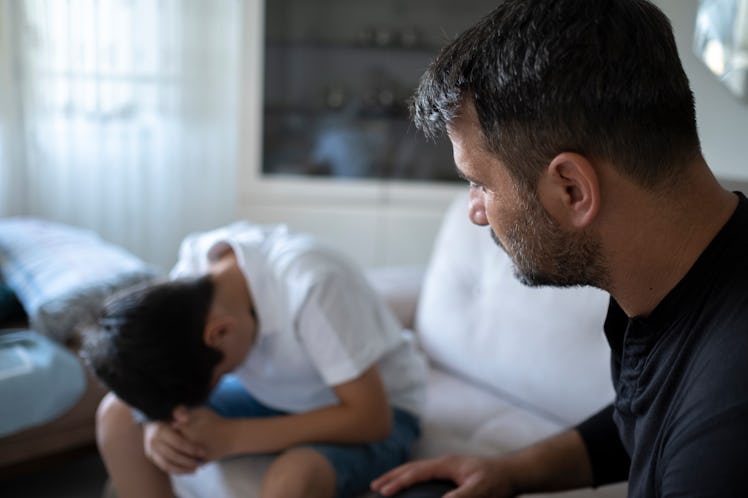Yelling At Your Kids Is Verbal Abuse And Has Lifelong Consequences
An alarming new study highlights the longterm effects — and serves as a warning to us all.

It’s commonly accepted that spanking kids, or disciplining them with any other type of physical punishment, is a form of abuse. But many parents and experts alike still don’t recognize that yelling at kids constitutes verbal abuse, a new study finds. And not only does this verbal abuse jeopardize the parent-child relationship, but it can also have major negative consequences on a child’s health later in life.
“Childhood verbal abuse desperately needs to be acknowledged as an abuse subtype, because of the lifelong negative consequences,” lead author of the study and a director of Wingate University’s Master’s of Public Health program, Shanta Dube, Ph.D., said in a statement.
The meta-analysis study, which reviewed the results of 166 previous studies, found that being the victim of verbal abuse increases the risk of children developing anger, depression, substance abuse, and obesity, and it increases the risk of them engaging in self-harm.
“Preventing the maltreatment of children is the most effective way we can reduce the prevalence of child mental health problems,” study co-author and head of psychology and language sciences at University College London, Peter Fonagy, Ph.D., said in the statement.
The researchers found that shouting and screaming at kids is the most documented form of verbal abuse. However, adults don’t have to raise their voices to verbally abuse children. Intent, delivery, words used, and immediate impact on a child can also be reasons that something an adult says is verbal abuse.
Parents are the most likely adults in a child’s life to verbally abuse them. The research team found that 77% of perpetrators of childhood verbal abuse are parents and 2% are other adult caregivers in their homes. Additionally, 13% are teachers, 1% are coaches, and 1% are police.
If you’re thinking back on the times you may have gotten frustrated with your child and yelled at them, don’t beat yourself up. That doesn’t help anyone. Rather, focus on recognizing your triggers, regulating your emotions, and training yourself to only raise your voice in crucial situations in which your child is at risk of getting hurt, such as if they run out into the street.
When you slip up and yell at your child, there are ways to mitigate the damage. Be vulnerable with them and explain that you’re sorry you yelled, that you’re trying to stop doing it, and that sometimes you make mistakes. This not only will make your child feel more secure, but it will also give them a template to follow for making amends when they mess up in the future.
“All adults get overloaded sometimes and say things unintentionally. We have to work collectively to devise ways to recognise these actions and end childhood verbal abuse by adults so children can flourish,” Jessica Bondy, founder of Words Matter, a charity aiming to end verbal abuse against children, said in the statement. “Words have weight, they can uplift or destroy. Let’s build children up, not knock them down.”
This article was originally published on